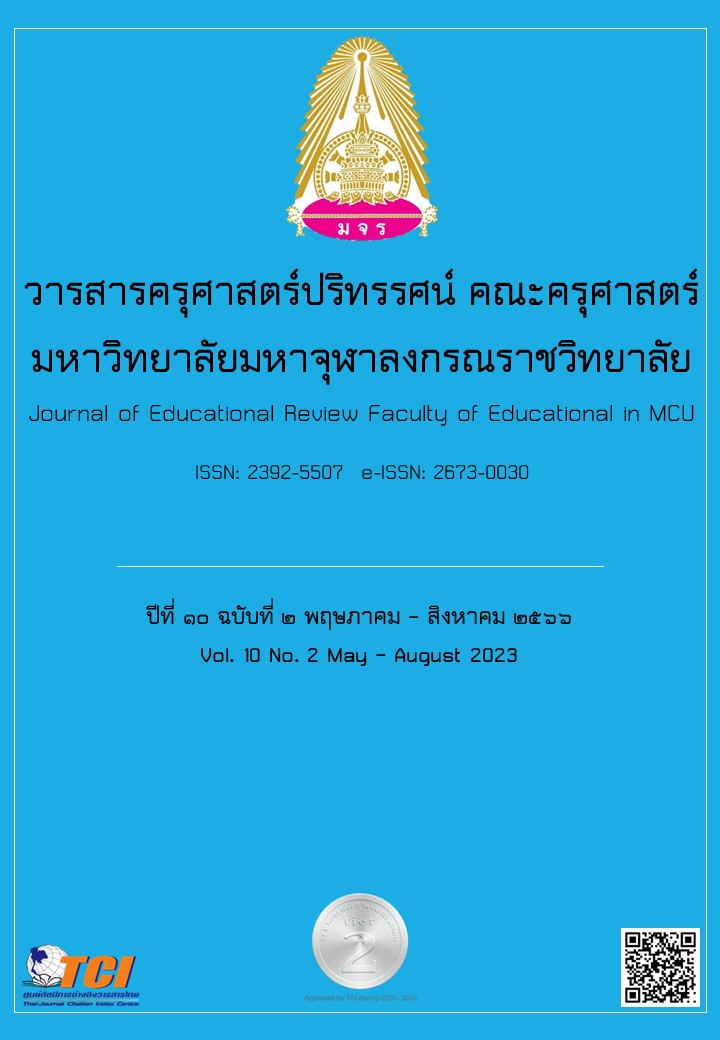ORGANIZATION BEHAVIOR CHANGE : CASE STUDY OF WORK FROM HOME
Main Article Content
Abstract
The purpose of this research was to 1) to study the organization behavior change: a case study of work from home, and 2) to study the problems and obstacles of organization behavior change: a case study of work from home. This research was qualitative. Key Informants obtained from a purposive selection from executives and general personnel in government and private organizations involved in this study and had experience for work from home while there was controlled of the COVID-19 epidemic, totaling 20 key informants by a purposive selection. The tool using for data collection was a structured interview. The results found that 1) the organizational behavior change: a case study of work from home, including age, due to the deterioration of the body in older people, making it impossible to sit and work for a long time resulting in a work delay. Gender affected changes in work from home behavior because males were excited, and enjoy working at home, able to perform work immediately, no advance planning. While the female gender was concerned about having to work at home. It took time to adjust. Marital status affected changes in work from home because the married individuals might be distracted by their family and would distract them from work. A person with a single status lived alone had no problem. Personality affected changes in work from home behavior by persons with discipline, being responsibility, being honest with themselves, liked to plan, prioritized, being to manage work and personal time very well. Individuals with independent personalities were open to new things. You could easily adapt to work at home. Attitude affected changes in work from home behavior because people had a good attitude to work at home, being enthusiastic in their work and able to work happily. While the persons had negative attitudes to work at home, lacking of inspiration for work, seeing work at home as a hindrance. Therefore, work was more likely to fail than success. The perception of persons affected changes in work from home behavior by recognizing their roles and responsibilities, people developed responsibility and discipline in their work, 2) the problems and obstacles were lacked of technology availability, lacked of interaction with colleagues, poor communication problems, lacked of technology skills, health and psychological problems, and environment problems.
Article Details

This work is licensed under a Creative Commons Attribution-NonCommercial-NoDerivatives 4.0 International License.
ทัศนะและความคิดเห็นที่ปรากฏในบทความในวารสารฉบับนี้ถือเป็นความรับผิดชอบของผู้เขียนบทความนั้นเพียงผู้เดียว และไม่ถือเป็นทัศนะและความรับผิดชอบของกองบรรณาธิการ
กองบรรณาธิการขอสงวนสิทธิ์ในการคัดเลือกบทความลงตีพิมพ์และจะแจ้งให้เจ้าของบทความทราบหลังจากผู้ประเมินบทความตรวจอ่านบทความแล้ว
ต้นฉบับที่ได้รับการตีพิมพ์ในวารสารครุศาสตร์ปริทรรศน์ คณะครุศาสตร์ มหาวิทยาลัยมหาจุฬาลงกรณราชวิทยาลัย ถือเป็นกรรมสิทธิ์ของคณะครุศาสตร์ มหาวิทยาลัยมหาจุฬาลงกรณราชวิทยาลัย ห้ามนำข้อความทั้งหมดหรือบางส่วนไปพิมพ์ซ้ำ เว้นเสียแต่ว่าจะได้รับอนุญาตจากมหาวิทยาลัยฯ เป็นลายลักษณ์อักษร
References
กรมสุขภาพจิต กระทรวงสาธารณสุข. (2563). Work From Homeพัง งานไม่เดิน สุขภาพจิตแย่ เช็ค 7 สัญญาณที่ต้องรีบแก้. แหล่งที่มา www.dmh.go.th/news-dmh/view.asp%3Fid%3D30695+&cd=2&hl=th&ct=clnk&gl=th. สืบค้นเมื่อ 12 ก.ย. 2563.
กัลยา วงษ์ลมัย. (2556). ปัจจัยที่มีผลต่อประสิทธิภาพในการปฏิบัติงานของพนักงาน บริการด้านเครื่องรูดบัตรเครดิต (ธนาคารกรุงศรีอยุธยา). วิทยานิพนธ์บริหารธุรกิจมหาบัณฑิต. มหาวิทยาลัยสยาม.
ณัฐธิดา สุพรรณภพ. (2559). ความสัมพันธ์ระหว่างความเครียดในการทำงาน คุณภาพชีวิตในการทำงาน การรับรู้คุณค่าของงานและความเหนื่อยหน่ายในการทำงาน ของบุคลากร สายวิชาการ กรณีศึกษามหาวิทยาลัยในกำกับของรัฐแห่งหนึ่งในเขตกรุงเทพมหานคร. วิทยานิพนธ์ศิลปศาสตรมหาบัณฑิต. มหาวิทยาลัยธรรมศาสตร์.
ทวี สุรฤทธิกุล. (2563). การ Work From Home. แหล่งที่มา https://siamrath.co.th/n/240753. สืบค้นเมื่อ 15 ก.ย. 2563.
ธนาคารแห่งประเทศไทย. (2563). ธปท.เปิดผลสำรวจ 63% ไม่สามารถทำงานที่บ้านได้. แหล่งที่มา https://www.bot.or.th. สืบค้นเมื่อ 12 มิ.ย. 2563.
บุญฑริกา แจ้งเจริญกิจ. (2556). บรรยากาศองค์การที่มีอิทธิพลต่อพฤติกรรมการเป็นสมาชิกที่ดีขององค์กรการของบุคลากรสำนักงานอธิการบดีมหมาวิทยาลัยมหิดล. วิทยานิพนธ์รัฐประศาสนศาสตรมหาบัณฑิต. มหาวิทยาลัยมหิดล.
ปุริศ ขันธเสมา. (2562). ความพึงพอใจในการทำงานที่บ้านในช่วงโควิดระบาด โควิด-19 ของกลุ่มงานพิสูจน์เอกลักษณ์บุคคล สำนักงานพิสูจน์หลักฐานตำรวจ สำนักงานตำรวจแห่งชาติ. วิทยานิพนธ์รัฐประศาสนศาสตรมหาบัณฑิต. มหาวิทยาลัยสยาม.
มนัสนันท์ ศรีนาคาร. (2553). การทำงานทางไกลและที่บ้าน (Telework and Work at Home). วารสารการจัดการสิ่งแวดล้อม. 6(1). 109-118.
วีรยา อิทธิพัฒน์ภาคิน และอานนท์ ทับเที่ยง. (2562). การศึกษาทัศนคติในมุมมองของพนักงานที่มีผลต่อการทำงานจากที่บ้าน. รายงานการวิจัย. มหาวิทยาลัยเทคโนโลยีพระจอมเกล้าธนบุรี.
สมฤดี คุ้มเดช. (2559). การศึกษาปัจจัยด้านลักษณะส่วนบุคคล ปัจจัยด้านเศรษฐกิจ ปัจจัยด้านสังคม ปัจจัยด้านสิ่งแวดล้อม ในองค์กรและปัจจัยด้านข้อมูลสถานภาพส่วนบุคคลที่มีผลต่อคุณภาพชีวิตของพนักงานในบริษัทเอกชน. วิทยานิพนธ์บริหารธุรกิจมหาบัณฑิต. มหาวิทยาลัยกรุงเทพ.
สุขใจ ว่องไวศิริวัฒน์. (2563). “Work from Home” ที่ทำงานที่ไม่ใช่ที่ทำงาน. แหล่งที่มา https://www.bot.or.th/Thai/BOTMagazine/Pages/256303_BOTGettoKnow.aspx. สืบค้นเมื่อ 6 ก.ย. 2563.
Robbins, S. P. (1993). Organizational Behavior: Concept, Controversies and Applications. 6th ed. Englewood Cliffs: Prentice Hall.
The New England Journal of Medicine. (2020). Challenges of “Return to Work” in an Ongoing Pandemic. From https://www.nejm.org/doi/pdf/10.1056/NEJMsr2019953?articleTools=true. Retrieved November 9, 2020.


